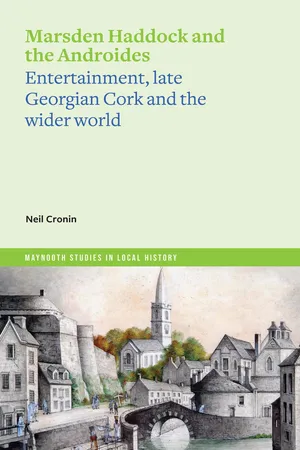
Marsden Haddock and the Androides
Entertainment, Late Georgian Cork and the Wider World
- 81 pages
- English
- PDF
- Available on iOS & Android
About this book
By the late eighteenth century, many people had designated leisure time. The appetite for novelty in popular entertainment became insatiable. The hero of this story is Marsden Haddock, who devised an exhibition of mechanical ingenuity, the Androides. Haddock' s spectacle originated in Cork in 1794, from where he then toured through the English-speaking Atlantic world (a reversal of the usual trend) with considerable success for many years. The word Androide became synonymous with his devices. In probing the penumbra between man and machine, between the animate and the inanimate, Haddock' s lifelike automata and other figures provoked wonder and often fear. A singular character, Haddock was distinguished by ingenuity, versatility and, in the face of recurrent setbacks, resilience. This volume positions him and his entertainment as products of the booming war-economy of Cork city, and uses its ready reception as an illustration of the integration of urban Cork into the wider world.
Frequently asked questions
- Essential is ideal for learners and professionals who enjoy exploring a wide range of subjects. Access the Essential Library with 800,000+ trusted titles and best-sellers across business, personal growth, and the humanities. Includes unlimited reading time and Standard Read Aloud voice.
- Complete: Perfect for advanced learners and researchers needing full, unrestricted access. Unlock 1.4M+ books across hundreds of subjects, including academic and specialized titles. The Complete Plan also includes advanced features like Premium Read Aloud and Research Assistant.
Please note we cannot support devices running on iOS 13 and Android 7 or earlier. Learn more about using the app.
Information
Table of contents
- Cover
- Editor's note
- Title page
- Copyright page
- Contents
- Acknowledgments
- Introduction
- 1. Marsden Haddock and Cork
- 2. London and back to Cork
- 3. Touring in Britain and America
- Conclusion
- Notes